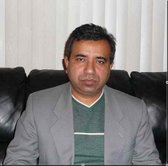 Jukti Kalita, a marketing professional with a Ph.D. from Columbia university has written several short-stories and translated several Assamese stories to English.
Jukti Kalita, a marketing professional with a Ph.D. from Columbia university has written several short-stories and translated several Assamese stories to English.
First. second and third parts of this story were published in the February, March and April 2007 issues respectively..
====================================================
(5)
This story of inter-religious marriage was repeated with a twist after five years for the Nachnani family. The wounds that they had suffered when Madhuri had married against their approval had scarcely healed, when the next shock shook them. This time it was their son Amitava. He fell in love with an Afghan girl named Shaheen. He met her at a party at her sister’s home and immediately fell in love with her. She was extremely fair with a light reddish hair. Her parents had a grocery store in Queens. She was very fair almost like a white person – far fairer than Amitava or any Indian he knew. She was tall at 5’8’’, svelte and grew up in the US. She spoke with unaccented English at school and a flawless Urdu at home. She liked Hindi movies- her favorite stars were Ashwairya Roy and Amitabha Bacchan.
But she prayed regularly to almighty Allah. Now it was Shaheen’s turn to go to the heaven by converting a non-Muslim. He got circumcised before the marriage. Zeenat’s family helped him with the change. He grew a beard, learnt the Koran and became a Muslim to marry her.
Amitava kept his name and informed his parents only a month before the planned wedding date. This time the Nachnanis were a lot more receptive - at least outwardly.
(6)
Inwardly, Mohan and Radha were again devastated. They cried. Their friends consoled them. They did not want to accept but had no choice.
What an irony! What they had tried to avoid their whole lives befell them. Not once, but twice did the power of love sway away their precious children into the folds of a religion that had a lot to hate about. They tried to analyze. What did they do wrong? What could they have been done differently? They felt that they had lost control over everything that they had in the world. They started blaming themselves - they should not have come to the US. After all what did they accomplish in this country - except for a somewhat higher standard of living. Not that they would not have done well in India given their higher levels of education.
Zeenat and Shaheen’s family encouraged them to look at Islam to get rid of the tumultuous agony. They went to mosque several times.
Mom was in favor of converting. Dad resisted the idea. Mom argued that the kids were the only precious possessions they had - they had lived their lives for their kids. Mom started covering her head with a veil. She threw away the packets of sindur that she had in her jewelry box. Though she did not apply the red powder in the part of her hair and her forehead regularly - that indeed was momentous. Hindu married women have traditionally applied sindur in their foreheads for thousands of years - that’s what her mother and grandmother and countless generations of women did every day of her life after marriage.
Mohan set up an appointment with Shaheen’s family maulavi for their conversion to Islam. He made an appointment with a doctor to have a circumcision of his male organ done though he was 65 years of age. He and Radha started eating beef – something that they had assiduously avoided all their lives in the US. There will be a big coming out party that night – both Imran and Shaheen’s families would throw a party at the posh Akbar hotel in Metuchen. They selected two Islamic names for themselves.
The weight of the heavy decision that they had taken did not descend on them right away. But as the faithful day approached they could not reconcile to the fact of changing their religion. The unease multiplied. Images from their childhood when they were forced out from what would ultimately become Pakistan, wanderings that they experienced upon initial arrival in India and the years of uncertainty and hardship that their parents and they themselves faced while trying to set roots in India started to own their minds. But they loved their kids immensely.
This was all so opposed to what they had grown up with in India and US. Their brothers and sisters back in India wanted them to come back. A few days before the formal conversion, they bought tickets to Bombay. Never before in their lives had they taken such a huge decision so impulsively.
They had three options in front of them. First, they could maintain the status quo, that is remain Hindus and in spite of all the contradictions try to maintain warm relationships with their kids. Second, they could go back to India and forget all the unpleasantness. Third, they could embrace Islam and be in complete harmony with their kids.
Finally sanity prevailed. There was no party. They decided to visit India for several months and see how things go. This will give them ample time to make a decision that they could live rest of their lives. In India they stayed with their siblings in Bombay and went on an extended pilgrimage – to Benares, to Dwarka, to the Himalayas and to Nepal. At the time the party was supposed to happen, they were on the Air India flight from the JFK airport.
When they came back from India six months later, they were changed. They decided to remain Hindus and maintain friendly relationships with their kids and their families.
(Concluded)
- Log in to post comments